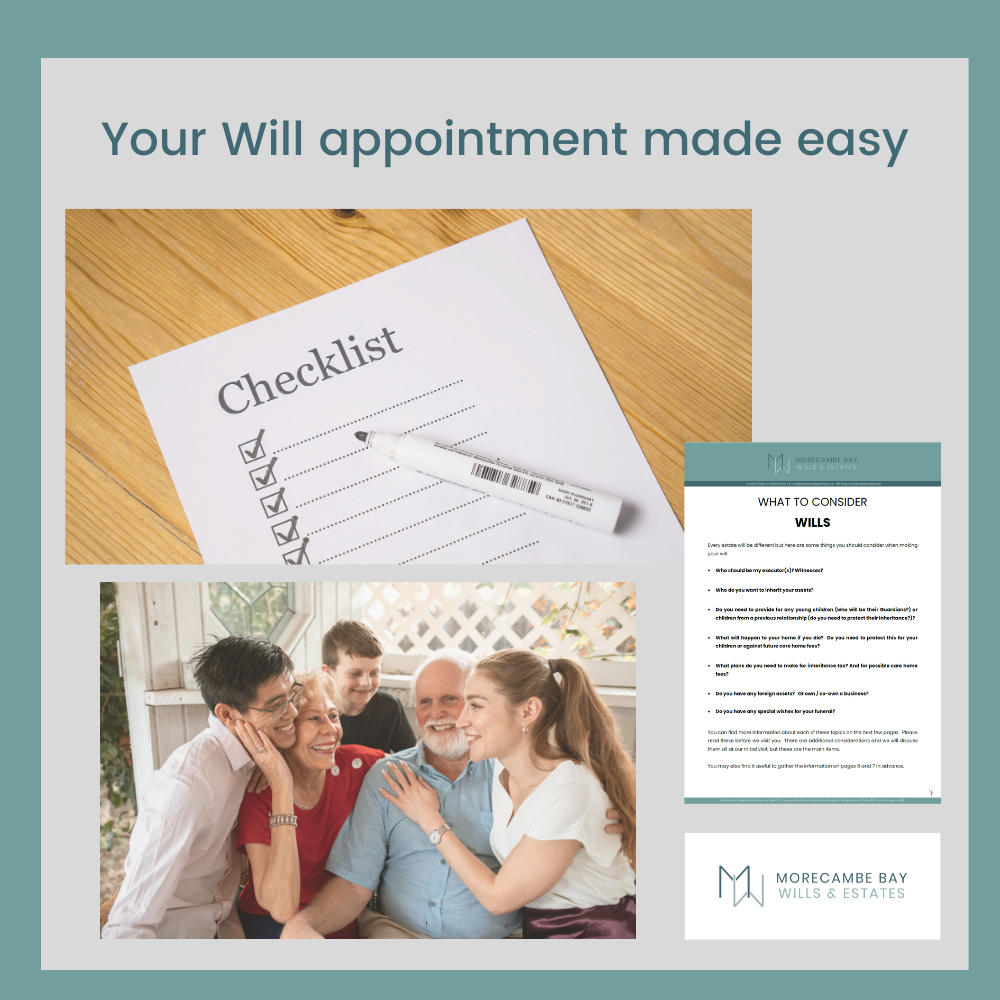Preparing for your Will appointment
Preparing for your Will appointment isn’t something to worry about. Lots of clients ask us what they need to do or think about in advance. We send out a “What to Consider” pack about a week before we see you, so you have time to think about things. However, we never assume you will know all the answers on the day, so please don’t be concerned – we are there to make it easy!
Jane explains a little more:

Things not to do when preparing for your Will appointment.
- Panic
- Worry
- Stress
- Cancel the appointment because you can’t bear to discuss it
- Put it off
- Do nothing
Things to do when preparing for your Will appointment
- Put the kettle on
- Make yourself a brew
- Sit and read our “What to Consider pack” – more on this below!
- Get together any documentation you might need about what you own/have
- Get your ID ready for us
- Think about who you want to leave your property /money to
- Make a list of questions you have

Questions to think about when preparing for your Will appointment
Q: Who are going to be your Executors?
A: This is an important role – as they are the ones that sort everything out after you’re gone. Often, they are also the Trustees nominated in your will. Trustees are the ones that would deal with any ongoing issues with your assets. So, for example if someone under 18 was to inherit they would carry on being responsible for the money until that person came of age.
Q: Who should I appoint?
A: Often a couple will appoint each other and then one or more of their children /siblings or friends.
Single people often appoint close family members and or friends.
A professional Trustee and Executor can be appointed if there is no one. They will charge for all the work they do.
Q: How many can I have?
A: At least 2 is the safest answer. If you only have one and they die before you – then you will need to amend your will.
Q: Who should they be?
A: People who you know and trust. Normally we would suggest they were not older than you.
Q: Should I let them know?
A: Absolutely – do not appoint anyone that isn’t willing. You need to let them know where your will is and any informal directions you want to give in relation to your funeral for example. We can prepare a letter for you setting out how you want your funeral to be conducted and you can amend that at any time.
Q: Who are going to be the guardians of your children under 18?
A: This is a really important thing to think about before your appointment if you are a young parent.
Q: What is a guardian?
A: A guardian is who you appoint to look after your children if you should die.
Q: Who should I appoint?
A: People you trust with your most important assets!
Q: How should I prepare them?
A: First of all – ask them if they are willing to do it! And then discuss with them what you’d want to happen.
We can help you prepare a letter directing your wishes for how you want your children to be brought up.
Q: Do you have children from a previous relationship?
A: If so, you need to consider how you are going to provide for them.
You may wish to consider leaving your share of your home in a simple trust to protect their inheritance. This is common for parents of children from a previous marriage and to ensure your children aren’t bypassed if your spouse re-marries in the future.
Q: What is to happen to your property?
A: If you jointly own your home then your share will automatically go to your spouse. This may not be what you want. There is a risk that if your partner remarries after you are gone then the share in the house you had would go to their new partner rather than your own children. Leaving the property in a trust can mitigate this. It is also useful for care home fee planning.
To do this, you need to make sure you and your partner hold the property as “tenants in common” so your share doesn’t automatically go to the other owner. In these circumstances it is common to set up a trust, with a “life interest” that ensures your partner can continue to live in your home for as long as needed, even though your share has passed to others e.g. your children.
This might sound a little complicated but don’t worry. We will explain it to you when we meet, and you can read more in our blog here. What you need to consider before your appointment is whether you want to leave the house to each other or protect your share for the children.

Q: Do you own a property abroad?
A: If you own a property abroad, or have money in accounts held outside the UK, you will need to plan appropriately. While your UK will can ensure your UK assets are dealt with, it does not always cover your foreign assets.
You may need to make a separate Will in the foreign country, but we can help you understand if that’s appropriate.
Q: Who are you leaving your estate to?
A: This is important of course. You may know who you’d like to leave everything too, but have you considered if that person isn’t around? When preparing or your Will appointment, have a think about substitutes. And maybe what would happen in the event of a disaster, where none of you were around.
This is also an opportunity to think about supporting your favourite charity in a small way. Legacies left in Wills make a huge difference to charities and yours could help so much!
Q: Am I obliged to name particular people as my beneficiaries?
A: Anyone who is left an inheritance is called a “beneficiary”. People often assume they have to leave it to family. They don’t. It is entirely your choice who benefits. We will help you to understand who may make a claim if you decide to exclude them.
Q: Are there things I should consider about my beneficiaries?
A: Here are some things to consider when leaving inheritances:
- If your beneficiaries include young children, at what age should they receive their inheritance?
- Do any of your beneficiaries lack capacity? Are they able to manage their own finances?
- Do you want to leave any specific gifts of money to anyone? Or to a charity?
- Do you have specific personal possessions you want someone to inherit? You will need to add these to your will and provide the full name and address of the beneficiary.
- What should happen to an inheritance if one of your beneficiaries dies before you do?
- What do you want to happen to the rest of your estate after the inheritances have been distributed to your beneficiaries? (This is known as your “residual estate”)
- Is there anyone you want to exclude from inheriting your assets? If so , why? We will help you to do a detailed “letter of wishes” explaining your reasons for your decision.
Q: What do you want to happen at your funeral?
A: It isn’t easy to talk about this, but make sure your wishes are known and included in your will. This will make sure the difficult decisions are made for your loved ones. Think about if you wish to be buried or cremated, and if you want any or all your organs to be donated or used for research.
Q: What about inheritance tax?
A: If your estate is worth more than £325,000 (after debts and tax) you will be liable for inheritance tax. Married couples are usually entitled to transfer unused allowance from their partner, so the surviving partner can claim up to £650,000. Unmarried couples cannot transfer allowances. There are additional allowances for residences passing to children, but the rules are more complex. You can read more about IHT in our recent blog here.
It is important to make a list of all your property, assets, policies and pensions prior to our consultation so we can discuss what this means for tax and any specialist advice you may need.
You may need to make a separate Will in the foreign country, but we can help you understand if that’s appropriate.

Q: Do you run a business?
A: If you own or co-own a business, you need to consider how your assets should be passed on should you die. You should consider:
- How you want the business to be run without you
- If your beneficiaries want to be involved or not
- Shareholder or partnership options for your family so they can help look after the business when you’re no longer around.
- The company’s Articles of Association or other agreements that may be in conflict with your wishes
- Who should be your trustees for your business affairs (they can be different to those for your personal affairs)
It is important to plan well as your business assets can affect Inheritance Tax. We can discuss this at our visit.
Q: Do you have pets to be provided for?
A: Pets are just chattels in the eyes of the law and so its important that unless you know your family members will keep your pets, you make provision with where they should go. You can consider nominating someone to have them and leave a gift of money to support the pet. Or you can chose an animal charity that you know will take care of them. We can help you on this.
As you can see, there are lots of things to consider when preparing for your Will appointment. But please don’t worry. Not everything applies to everyone. And we take it slowly and give you plenty of time.
Our job is to be your trusted advisor. And, more importantly, make it easy for you!
And what happens afterwards?
Here are some other common questions you may think about when preparing for your Will appointment.
Q: What happens after my appointment?
A: We send you’re a copy of our notes and any decisions or information we still need. Once we have that, we prepare drafts of your documents to review. We can then make any changes you need before we arrange for your Will to be signed.
Q: How do I make sure my Will is valid?
A: Once you are happy with your final draft, you will need to sign it and you will need to consider who can be your two witnesses – they should be present when you sign so they can confirm it is your signature.
We can be one of your independent witnesses if you wish. Witnesses should be impartial and cannot be one of your beneficiaries or their spouse/partner. It’s also best not to have a family member as a witness.
We will prepare all the documents for you and be present for the signing, as part of our service. if you are local, we can do this in our offices (where we have a second witness) or at your home. If you’re further away, we send them to you in the post with full instructions. and a return envelope if you’re storing documents with us. If you are storing yourself, we ask you to send us a scan/photo of the signed pages for our records. That way we can also check it has been done correctly to ensure against future problems.

Q: Where should I keep my will
A: Once you have signed your Will,. you need to keep it somewhere safe and secure, and make sure your executors can access it easily. We recommend our specialist will storage to make sure it’s safe and kept private. If you opt for our enhanced document storage service, you will also benefit from free will updates in the future. You can find more details in our blog here.
I hope this has been a useful overview of what to think about when preparing for your will appointment. The best thing to do, though, is give us a call on 01524 571032 or ask for more information via our website here. Let us help you make it easy



